Nasal polyps are soft, noncancerous growths that develop in the lining
of the nasal passages or sinuses. They are typically benign and often
associated with chronic inflammation of the nasal and sinus tissues. Call us to book an appointment with the best Otolaryngologist-Ear, Nose, and Throat (ENT) specialist or a Sinus Surgeon near you.
Nasal polyps are benign growths that develop in the lining of the nasal passages or sinuses. These soft, noncancerous masses can vary in size and may occur in one or both nostrils. Nasal polyps can cause nasal congestion, reduced sense of smell, facial pain, and other symptoms that significantly impact an individual's quality of life.
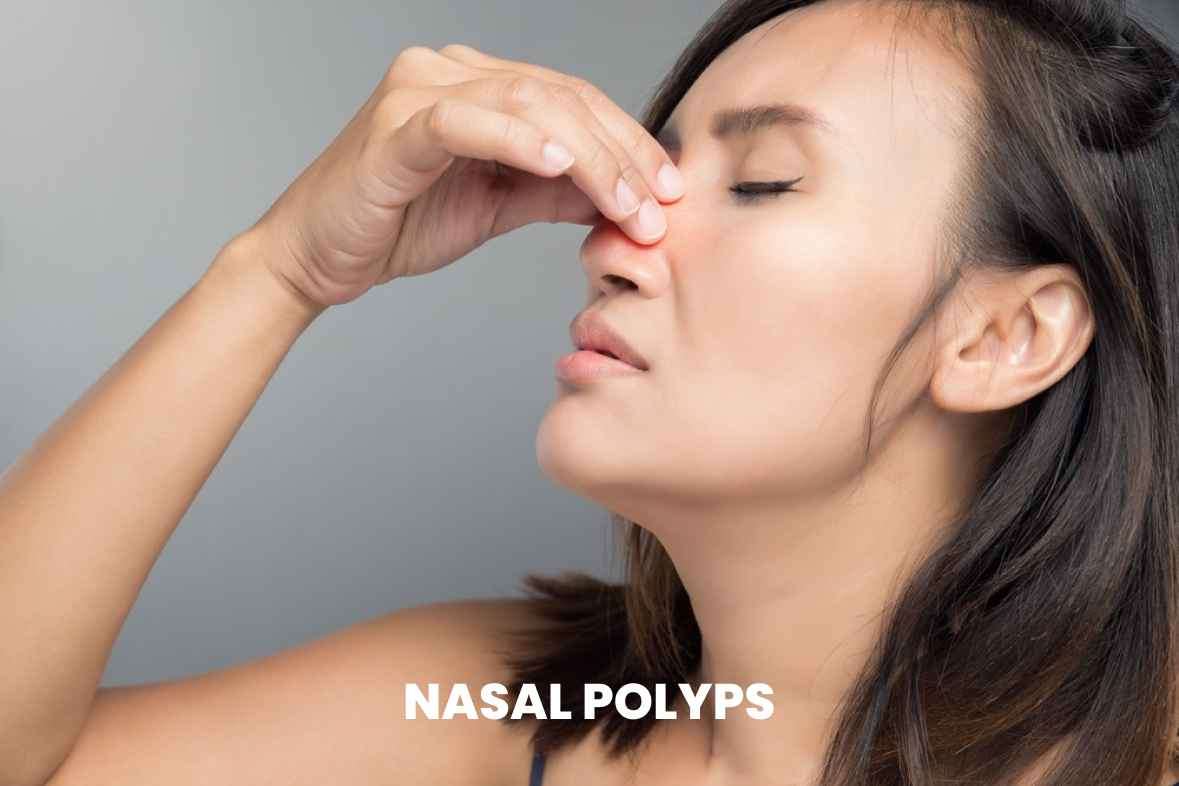
Nasal polyps are benign growths that develop in the lining of the nasal passages or sinuses. These soft, noncancerous masses can vary in size and may occur in one or both nostrils. Nasal polyps can cause nasal congestion, reduced sense of smell, facial pain, and other symptoms that significantly impact an individual's quality of life.
1. Chronic Inflammation:
Conditions such as chronic rhinosinusitis, allergies, asthma, and other
respiratory disorders can lead to ongoing inflammation in the nasal
passages, increasing the risk of nasal polyp development.
2. Nasal Congestion: Persistent nasal congestion can create a stagnant environment in the nasal passages, promoting the growth of polyps. 3. Genetic Predisposition: There may be a genetic component that makes certain individuals more prone to developing nasal polyps.
4. Aspirin Sensitivity:
Some individuals with asthma and nasal polyps may experience worsening
symptoms when taking aspirin or nonsteroidal anti-inflammatory drugs
(NSAIDs).
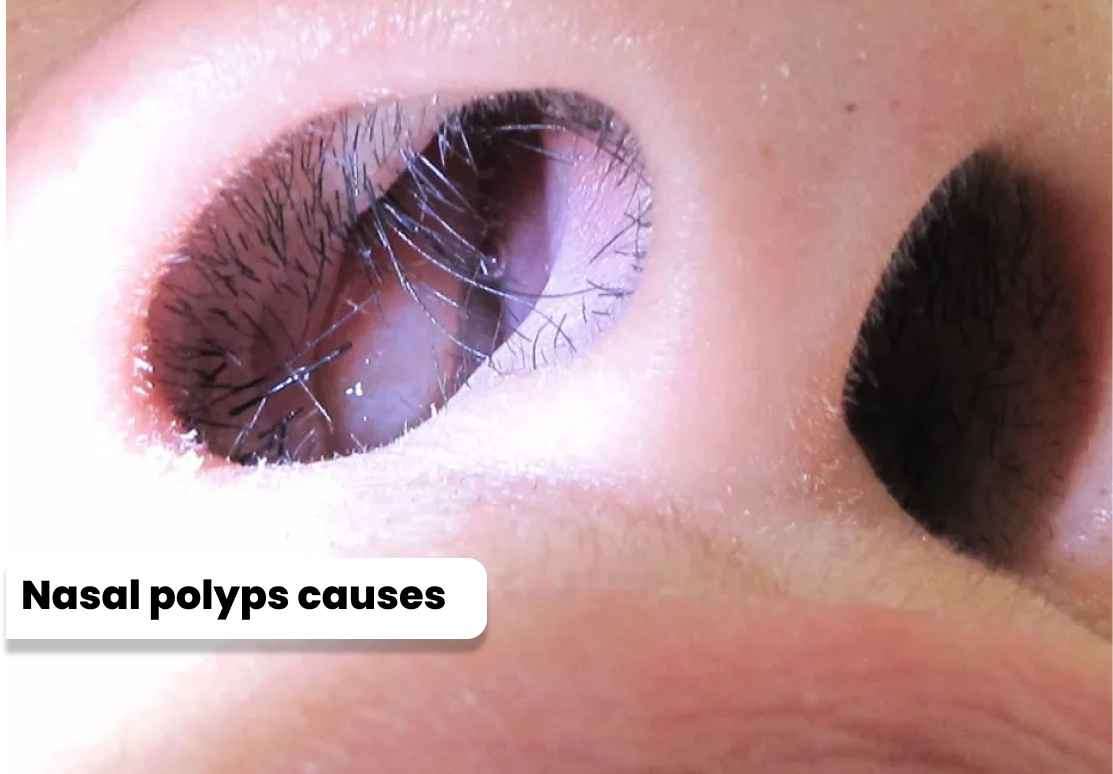
1. Chronic Inflammation:
Conditions such as chronic rhinosinusitis, allergies, asthma, and other
respiratory disorders can lead to ongoing inflammation in the nasal
passages, increasing the risk of nasal polyp development.
2. Nasal Congestion: Persistent nasal congestion can create a stagnant environment in the nasal passages, promoting the growth of polyps. 3. Genetic Predisposition: There may be a genetic component that makes certain individuals more prone to developing nasal polyps.
4. Aspirin Sensitivity:
Some individuals with asthma and nasal polyps may experience worsening
symptoms when taking aspirin or nonsteroidal anti-inflammatory drugs
(NSAIDs).
1. Nasal Congestion: Persistent stuffiness or blocked nasal passages, making it difficult to breathe through the nose.
2. Decreased Sense of Smell: A reduced ability to detect odors or a complete loss of the sense of smell.
3. Runny Nose: A constant discharge of clear, watery mucus from the nose.
4. Facial Pain or Pressure: Discomfort or pain in the face, particularly around the eyes, forehead, or cheeks.
5. Sinus Headaches: Recurrent headaches, often localized in the forehead or around the eyes.
6. Snoring: Nasal polyps can contribute to snoring or obstructive sleep apnea in some cases.
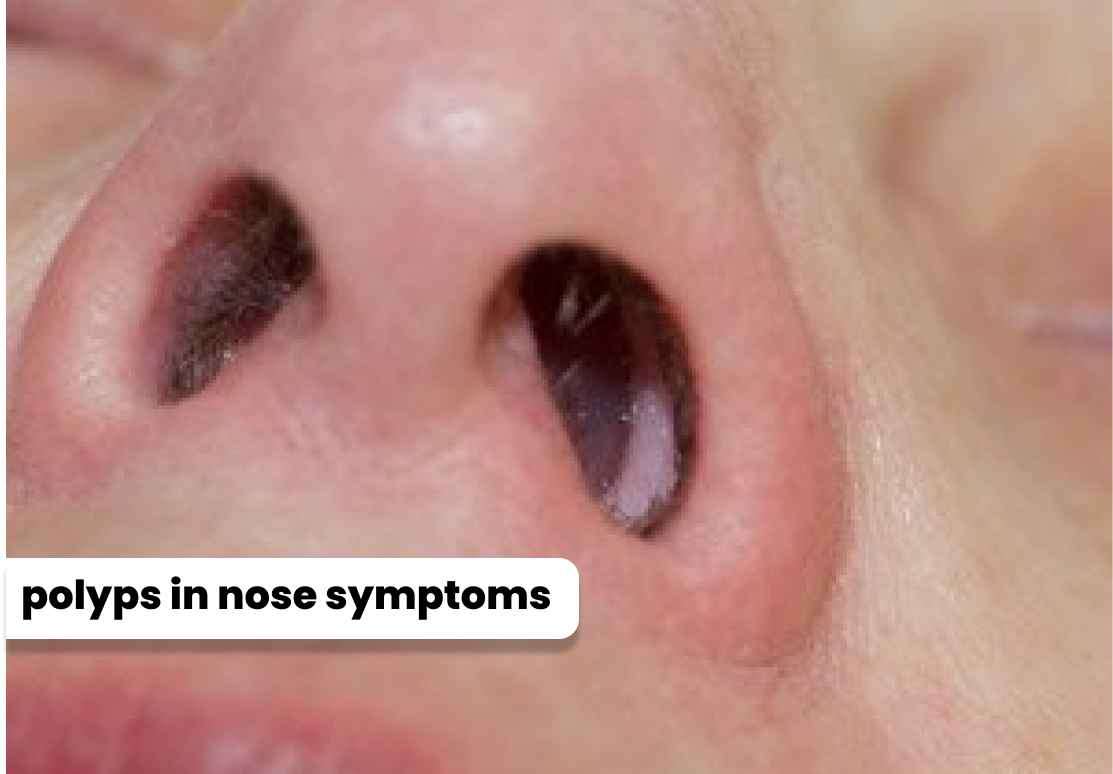
1. Nasal Congestion: Persistent stuffiness or blocked nasal passages, making it difficult to breathe through the nose.
2. Decreased Sense of Smell: A reduced ability to detect odors or a complete loss of the sense of smell.
3. Runny Nose: A constant discharge of clear, watery mucus from the nose.
4. Facial Pain or Pressure: Discomfort or pain in the face, particularly around the eyes, forehead, or cheeks.
5. Sinus Headaches: Recurrent headaches, often localized in the forehead or around the eyes.
6. Snoring: Nasal polyps can contribute to snoring or obstructive sleep apnea in some cases.
1. Nasal Corticosteroids: Prescription-strength nasal sprays containing corticosteroids help reduce inflammation and shrink nasal polyps.
2. Oral Corticosteroids: In severe cases, a short course of oral corticosteroids may be prescribed to quickly reduce inflammation and symptoms.
3. Saline Nasal Irrigation: Regular nasal rinses with a saline solution can help clear nasal passages and reduce congestion. 4. Allergy Management: If allergies contribute to nasal polyp formation, allergen avoidance measures or allergy medications may be recommended.
5. Nasal Decongestants: Short-term use of over-the-counter nasal decongestant sprays can provide temporary relief from congestion.
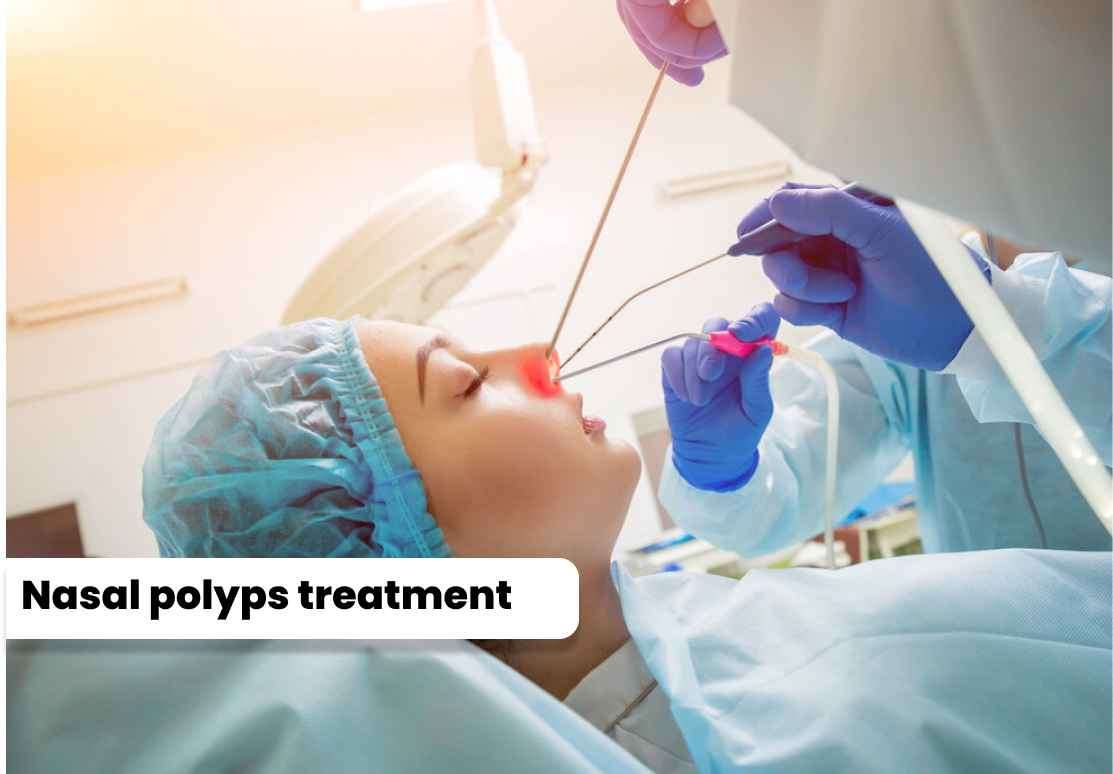
1. Nasal Corticosteroids: Prescription-strength nasal sprays containing corticosteroids help reduce inflammation and shrink nasal polyps.
2. Oral Corticosteroids: In severe cases, a short course of oral corticosteroids may be prescribed to quickly reduce inflammation and symptoms.
3. Saline Nasal Irrigation: Regular nasal rinses with a saline solution can help clear nasal passages and reduce congestion.
4. Allergy Management: If allergies contribute to nasal polyp formation, allergen avoidance measures or allergy medications may be recommended.
5. Nasal Decongestants: Short-term use of over-the-counter nasal decongestant sprays can provide temporary relief from congestion.
1. Endoscopic Sinus Surgery: This minimally invasive procedure involves the use of a thin, flexible tube with a camera (endoscope) to visualize and remove polyps. The surgeon removes the polyps and may also correct any underlying sinus issues contributing to polyp formation.
2. Ethmoidectomy: In cases where ethmoidal polyps (polyps located in the ethmoid sinuses) are the primary concern, an ethmoidectomy may be performed. This procedure involves removing the ethmoid sinuses to eliminate the polyps and restore normal sinus function. It is important to note that nasal polyps tend to recur, even after surgery. Therefore, postoperative care and long-term management strategies are crucial to prevent the recurrence of polyps. This may include continued use of nasal corticosteroids, regular nasal rinses, and monitoring for any signs of recurrence or worsening symptoms. In cases of sino nasal polyposis, where polyps are present in both the nasal passages and sinuses, a multidisciplinary approach involving an otolaryngologist and allergist may be necessary to provide comprehensive care.
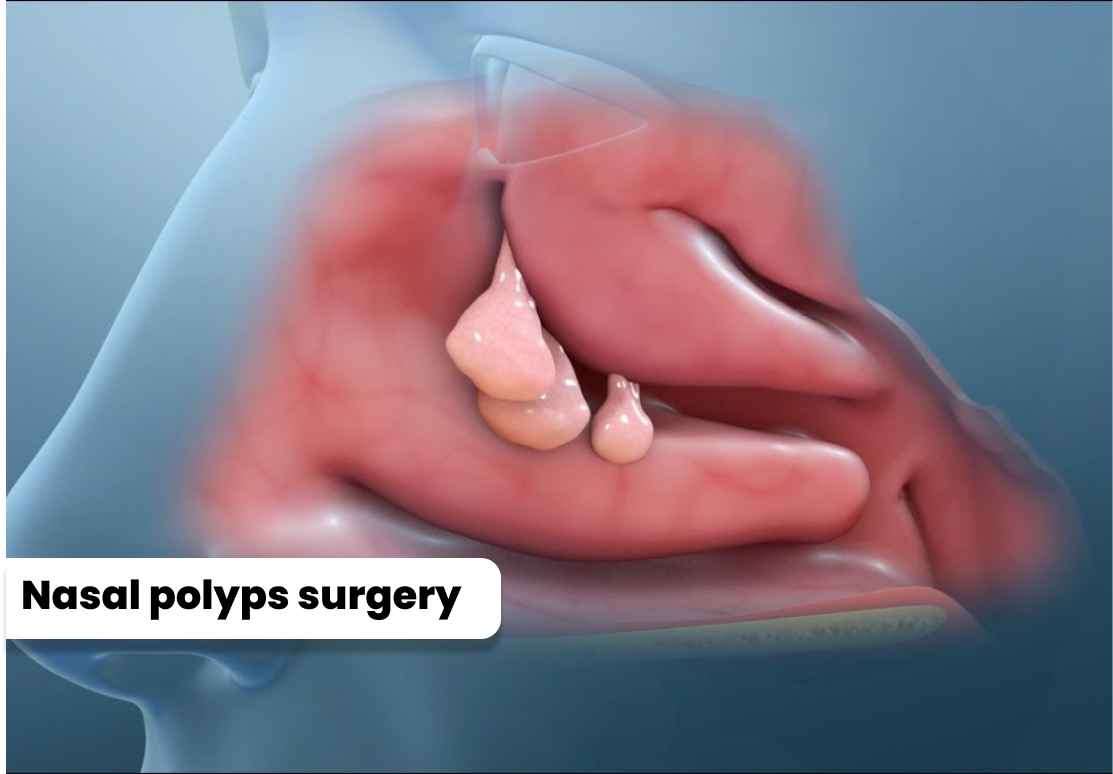
1. Endoscopic Sinus Surgery: This minimally invasive procedure involves the use of a thin, flexible tube with a camera (endoscope) to visualize and remove polyps. The surgeon removes the polyps and may also correct any underlying sinus issues contributing to polyp formation.
2. Ethmoidectomy: In cases where ethmoidal polyps (polyps located in the ethmoid sinuses) are the primary concern, an ethmoidectomy may be performed. This procedure involves removing the ethmoid sinuses to eliminate the polyps and restore normal sinus function.
It is important to note that nasal polyps tend to recur, even after surgery. Therefore, postoperative care and long-term management strategies are crucial to prevent the recurrence of polyps. This may include continued use of nasal corticosteroids, regular nasal rinses, and monitoring for any signs of recurrence or worsening symptoms.
In cases of sino nasal polyposis, where polyps are present in both the nasal passages and sinuses, a multidisciplinary approach involving an otolaryngologist and allergist may be necessary to provide comprehensive care.
|
Serial No |
City |
Minimum Cost (INR) |
Average Cost (INR) |
|
1 |
Mumbai |
25,000 |
80,000 |
|
2 |
Delhi |
22,000 |
70,000 |
|
3 |
Bangalore |
20,000 |
65,000 |
|
4 |
Chennai |
18,000 |
60,000 |
|
5 |
Kolkata |
15,000 |
50,000 |
|
6 |
Hyderabad |
15,000 |
50,000 |
|
7 |
Pune |
12,000 |
45,000 |
|
8 |
Ahmedabad |
12,000 |
45,000 |
|
9 |
Jaipur |
10,000 |
40,000 |
|
10 |
Chandigarh |
10,000 |
40,000 |
|
11 |
Lucknow |
8,000 |
35,000 |
|
12 |
Indore |
8,000 |
35,000 |
|
13 |
Kochi |
7,000 |
30,000 |
|
14 |
Coimbatore |
7,000 |
30,000 |
|
15 |
Bhopal |
6,000 |
25,000 |
|
16 |
Nagpur |
6,000 |
25,000 |
|
17 |
Goa |
5,000 |
20,000 |
|
18 |
Mangalore |
5,000 |
20,000 |
|
19 |
Trivandrum |
4,000 |
15,000 |
|
20 |
Guwahati |
4,000 |
15,000 |
|
Serial No |
Hospital Name |
City |
Contact Number |
|
1 |
All India Institute of Medical Sciences (AIIMS) |
Multiple Cities |
+91-11-26588500 |
|
2 |
Safdarjung Hospital |
Delhi |
+91-11-2673-0 |
|
3 |
Post Graduate Institute of Medical Education and Research |
Chandigarh |
+91-172-275-6565 |
|
4 |
Government Medical College and Hospital (GMCH) |
Nagpur |
+91-712-270-1646 |
|
5 |
King George's Medical University (KGMU) |
Lucknow |
+91-522-2257450 |
|
6 |
Madras Medical College |
Chennai |
+91-44-2530-5000 |
|
7 |
Institute of Postgraduate Medical Education and Research |
Kolkata |
+91-33-2204-1000 |
|
8 |
SMS Medical College |
Jaipur |
+91-141-251-8121 |
|
9 |
Government General Hospital |
Vijayawada |
+91-866-257-6000 |
Please Wait..